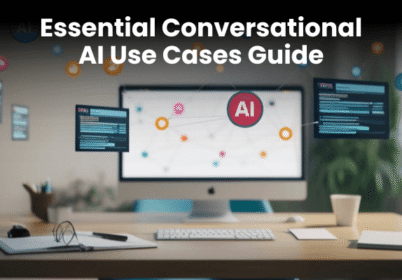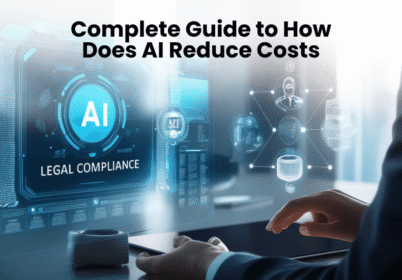Notion AI Explained: Features, Benefits, Pricing, Templates & How to Use It Effectively (2025 Guide)
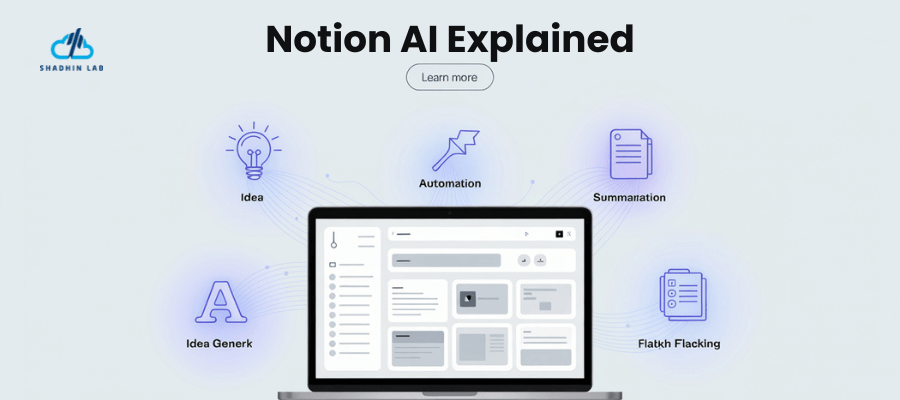
Table of Contents
Notion stands as a powerful all-in-one workspace for notes, documentation, project management, and team collaboration. Learning how to use Notion AI enhances this already robust platform with intelligent assistance for various content creation tasks. How to use Notion AI effectively involves understanding its capabilities for writing, summarizing, brainstorming, and automating repetitive content generation. This comprehensive guide explores Notion AI’s features, pricing structure, best practices, and alternatives to help maximize your productivity within the Notion ecosystem.
The integration of artificial intelligence directly into your workspace transforms how you interact with information and create content. Notion AI functions as your personal assistant, ready to help draft emails, summarize meeting notes, or generate creative ideas. This article provides a complete roadmap for leveraging this powerful tool across different use cases and workflows.
主要ポイント
- What Notion and Notion AI are, including how the AI integrates into the Notion workspace.
- The article explains how to use Notion AI step-by-step, covering features like writing, summarizing, and content organization.
- It highlights the key benefits of Notion AI, such as boosting productivity and saving time on repetitive tasks.
- Readers will learn about the limitations of Notion AI, including where human input is still essential.
- The article introduces top Notion AI templates tailored for writing, planning, and task management.
- It provides actionable tips and best practices for using Notion AI efficiently and avoiding common pitfalls.
- Readers will find detailed information on Notion AI pricing, including what’s included in free and paid plans.
- It offers alternative tools to Notion AI, comparing features and suitability for different user needs.
Table of Contents
What is Notion?
Notion operates as a versatile productivity platform designed for knowledge management, task tracking, and team collaboration. The application combines multiple tools into one integrated workspace for personal and professional organization. Users can create interconnected pages containing various content types through a flexible block-based system.
The platform’s modular approach allows for customizable workspaces tailored to specific needs and workflows. Each block functions as an independent content unit that can contain text, images, tables, databases, or embedded files. These blocks can be rearranged, nested, and connected to create powerful organizational systems.
Notion’s database functionality enables users to create structured collections of information with custom properties and views. Teams can collaborate in real-time, share workspaces, and maintain centralized documentation accessible to all members. The platform serves various purposes including note-taking, project management, knowledge bases, and collaborative documentation.
What is Notion AI?
Notion AI functions as an embedded artificial intelligence assistant integrated directly within the Notion platform. This intelligent tool helps users create, edit, and transform content without leaving their workspace. The AI assistant operates contextually, understanding the content of your pages and responding to specific requests.
The system can draft new content, rewrite existing text, summarize information, and generate creative ideas based on prompts. Users can access Notion AI through multiple entry points including the slash command menu, text selection, or dedicated AI blocks. The technology processes your instructions and page context to deliver relevant, coherent responses.
Notion AI assists with various writing tasks including drafting emails, creating blog posts, or generating meeting agendas. The assistant can transform content by changing tone, improving grammar, translating languages, or extracting key points. Users can leverage this tool to overcome writer’s block, streamline documentation, and enhance their overall productivity within Notion.
How to Use Notion AI – Complete Guide
Accessing Notion AI requires an active subscription to the feature as an add-on to your Notion plan. Once enabled, you can invoke the AI assistant through multiple methods within your workspace. The primary access points include:
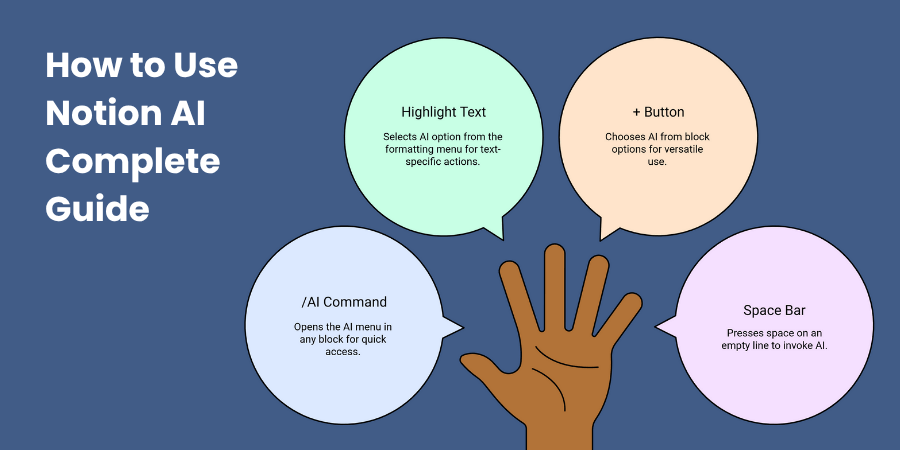
- Using the /AI command in any block to open the AI menu
- Highlighting text and selecting the AI option from the formatting menu
- Clicking the + button and selecting AI from the block options
- Pressing the space bar on an empty line and selecting AI
Notion AI offers numerous capabilities that enhance your productivity across different use cases:
Writing Assistance:
- Draft new content from scratch using specific prompts
- Continue writing based on existing text
- Generate outlines for articles, essays, or presentations
- Create lists, tables, and structured content
- Write emails, social media posts, or marketing copy
Content Transformation:
- Change the tone of your writing (formal, casual, professional)
- Improve grammar and readability
- Translate content between multiple languages
- Expand brief notes into detailed paragraphs
- Condense lengthy text into concise summaries
Summarization Features:
- Extract key points from meeting notes
- Identify action items from discussions
- Create executive summaries of documents
- Generate bullet-point overviews of complex topics
- Summarize research findings or articles
Brainstorming Support:
- Generate creative ideas for projects or content
- Create pros and cons lists for decision-making
- Develop questions for interviews or research
- Suggest approaches to problems or challenges
- Expand on initial concepts with related ideas
Specialized Functions:
- Create custom templates with AI-generated content
- Generate code snippets for various programming languages
- Draft job descriptions or project requirements
- Create personalized learning materials
- Develop structured documentation
Benefits of Notion AI
Notion AI delivers substantial productivity enhancements across various aspects of content creation and information management. The integration saves valuable time by automating repetitive writing tasks that previously required manual effort. Users can generate first drafts, outlines, or templates in seconds rather than starting from scratch.
The AI assistant helps overcome writer’s block by providing starting points and creative suggestions. Content quality improves through grammar corrections, tone adjustments, and structural enhancements applied to existing text. The summarization capabilities extract essential information from lengthy documents, meetings, or research materials.
Language barriers diminish through built-in translation features that convert content between multiple languages. Team collaboration benefits from standardized documentation formats and consistent communication styles across departments. The brainstorming functions generate diverse perspectives and ideas that might otherwise remain unexplored.
Decision-making processes accelerate with AI-generated pros and cons lists and structured analysis of options. Learning curves for new team members decrease through automatically generated explanations and documentation. Content creation workflows become more efficient with faster drafting and editing capabilities.
Cognitive load reduces as routine writing tasks shift to the AI assistant, allowing focus on higher-value activities. Consistency improves across all documentation through standardized formatting and terminology. Research processes benefit from quick summarization of findings and generation of follow-up questions.
Meeting productivity increases through automated note-taking, action item extraction, and summary creation. Creative projects receive inspiration through AI-generated ideas, approaches, and conceptual frameworks. Time management improves as content creation tasks that once took hours now require minutes.
Limitations of Notion AI
Notion AI exhibits certain constraints that users should recognize when incorporating the tool into their workflows. The assistant processes limited context from the current page, potentially missing relevant information from linked pages. Content generation occasionally produces generic responses that require significant refinement to match specific needs.
The system demonstrates inconsistent performance with highly technical or specialized subject matter requiring domain expertise. Character and word count limitations restrict the amount of text processed in a single request. Factual accuracy cannot be guaranteed, particularly for time-sensitive information or specialized knowledge domains.
Complex formatting requirements often need manual adjustments after AI-generated content creation. The assistant lacks access to real-time internet information, limiting its knowledge to training data. Language support varies in quality across different non-English languages and specialized terminology.
Creative writing assistance sometimes produces predictable patterns that lack distinctive style or voice. Context retention between separate AI requests remains limited, requiring repetition of background information. The system occasionally misinterprets ambiguous prompts, producing irrelevant or misaligned content.
Customization options for recurring tasks or specialized workflows remain somewhat restricted. The AI cannot directly access or modify database structures beyond simple content generation. Visual content creation capabilities are absent, limiting assistance to text-based outputs only.
Privacy considerations arise as content processed through the AI may contribute to model training. The tool works best with clear, structured prompts and struggles with vague or complex instructions. Certain writing styles or specialized formats may require significant human intervention after generation.
Best Notion AI Templates
Exploring AI-powered Notion templates enhances productivity by combining structured frameworks with intelligent content generation. These templates provide ready-to-use systems that leverage Notion AI’s capabilities across different use cases.
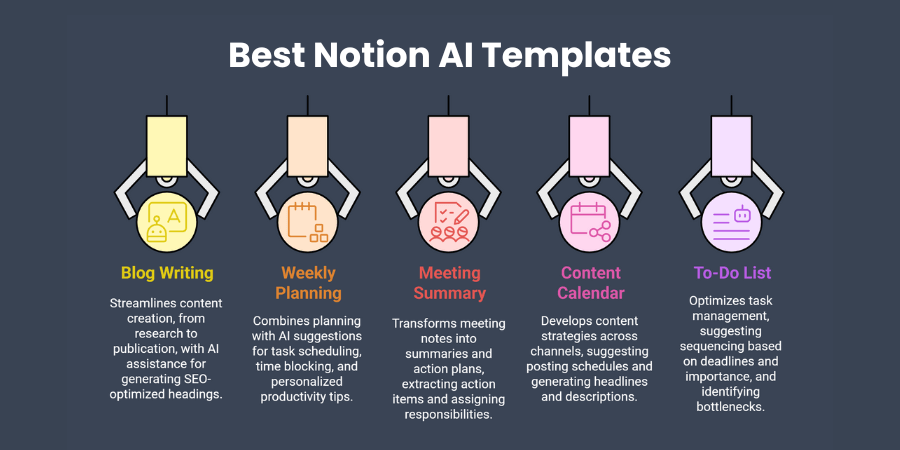
Blog Writing Template:
This comprehensive template streamlines the content creation process from ideation to publication. The structure includes sections for topic research, outline generation, and draft creation with AI assistance. Users can prompt the AI to expand bullet points into paragraphs or generate SEO-optimized headings. The template incorporates content calendars, keyword tracking, and performance analytics alongside AI-powered writing tools.
Weekly Planning with AI Suggestions:
This productivity template combines traditional planning elements with AI-generated recommendations. The system allows users to input goals and priorities, then request AI suggestions for task scheduling and time blocking. The template includes sections for reflection where AI can analyze previous weeks’ accomplishments and challenges. Customizable prompts help generate personalized productivity tips based on individual work patterns.
Meeting Summary Automation:
This collaborative template transforms meeting notes into structured summaries and action plans. Users can paste raw meeting transcripts and request AI-generated summaries highlighting key decisions and discussion points. The system automatically extracts action items, assigns responsibilities, and sets deadlines based on meeting content. Integration with team databases ensures accountability and progress tracking for all identified tasks.
AI Content Calendar Generation:
This marketing-focused template leverages AI to develop comprehensive content strategies across multiple channels. Users can specify target audiences, goals, and themes, then request AI-generated content ideas. The calendar automatically suggests optimal posting schedules and content types based on specified parameters. The system includes prompts for generating headlines, descriptions, and content briefs for each calendar entry.
AI To-Do List Prioritization:
This productivity template uses artificial intelligence to optimize task management and prioritization. Users list their tasks, then request AI analysis to suggest optimal sequencing based on deadlines, importance, and dependencies. The system includes prompts for breaking down complex projects into manageable steps with time estimates. Regular AI-powered reviews help identify potential bottlenecks and suggest workflow improvements.
Tips and Best Practices for Using Notion AI
Crafting effective prompts significantly impacts the quality of AI-generated content in Notion. Clear, specific instructions produce better results than vague requests or general questions. Including contextual information helps the AI understand the purpose and audience for the content being created.
Breaking complex requests into smaller, sequential prompts often yields better outcomes than single comprehensive instructions. The system responds well to structured formats like numbered lists, step-by-step guides, or table templates. Specifying tone, length, and formatting requirements upfront ensures more accurate first-draft outputs.
Iterative refinement produces superior results compared to expecting perfect content from initial prompts. Users should review AI-generated content carefully, then provide feedback through follow-up prompts for improvements. Creating a personal library of effective prompts for recurring tasks enhances consistency and efficiency.
Combining AI capabilities with Notion’s database features enables semi-automated workflows for content creation. Templates with embedded AI prompts streamline repetitive documentation tasks across teams. The system works particularly well when generating structured content like meeting agendas, project briefs, or documentation outlines.
Providing examples of desired outputs helps the AI understand specific stylistic or formatting expectations. Users should maintain appropriate security practices by avoiding sharing sensitive information through AI prompts. Regular experimentation with different prompt structures helps discover optimal approaches for specific use cases.
Notion AI excels at transforming existing content rather than creating highly specialized material from scratch. The tool functions best as a collaborative assistant rather than a complete replacement for human expertise. Establishing clear guidelines for AI usage within teams ensures consistent quality and appropriate application.
Notion AI Pricing
Notion AI operates as a premium add-on feature available to users across various subscription tiers. The pricing structure follows a straightforward model with different rates for individual users and team accounts.
| Plan Type | Notion Base Price | AI Add-on Price | Total with AI | Billing Options |
| 無料の | $0 | Not available | N/A | N/A |
| Personal | $5/month | $10/month | $15/month | Monthly/Annual |
| Personal Pro | $10/month | $10/month | $20/month | Monthly/Annual |
| Team | $10/user/month | $10/user/month | $20/user/month | Monthly/Annual |
| Enterprise | Custom | Custom | Custom | Annual |
Notion offers a free trial period allowing users to experience AI capabilities before committing to the subscription. The trial typically includes a limited number of AI requests to test various features. All paid plans receive the same AI functionality without feature restrictions between tiers.
Annual billing provides a discount compared to monthly payment options across all plan types. The AI add-on price remains consistent regardless of the base Notion plan selected by users. Enterprise customers can negotiate custom pricing based on team size and specific requirements.
Compared to standalone AI writing tools, Notion AI offers competitive pricing when considering the integration benefits. Many dedicated AI writing platforms charge $20-30 monthly for similar capabilities without Notion’s organizational features. The value proposition strengthens for existing Notion users who benefit from seamless workflow integration.
Notion AI Alternatives
Several alternative tools provide AI-assisted writing and productivity features comparable to Notion AI. Each option offers distinct advantages depending on specific use cases and integration requirements.
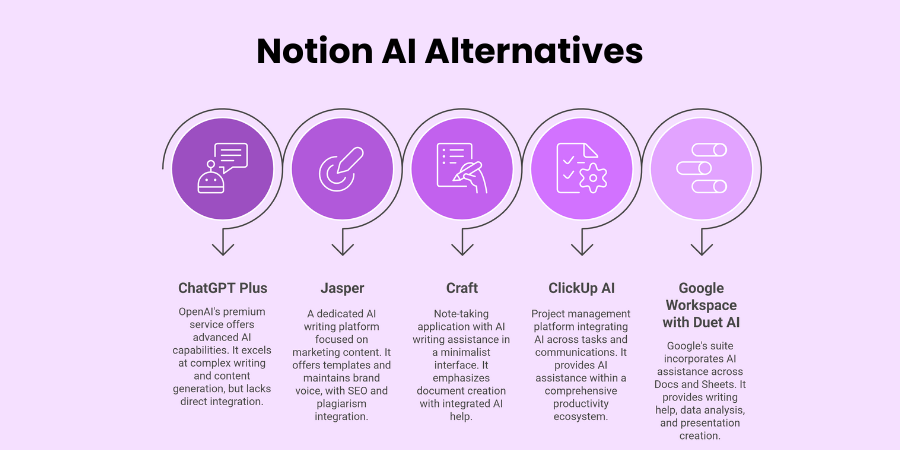
ChatGPT Plus:
OpenAI’s premium service provides advanced AI capabilities through a conversational interface. The system excels at complex writing tasks, creative content generation, and detailed explanations. However, it lacks direct integration with productivity tools and requires copying content between platforms. The service costs $20 monthly with unlimited usage within rate limits.
Jasper:
This dedicated AI writing platform focuses on marketing content creation and brand consistency. The system offers specialized templates for various content types and maintains brand voice across outputs. Integration with SEO tools and plagiarism checkers enhances content quality. Pricing starts at $39 monthly, positioning it as a premium alternative.
Craft:
This note-taking application incorporates AI writing assistance within a clean, minimalist interface. The platform emphasizes beautiful document creation with integrated AI help for writing and editing. The system offers better document export options but less robust database functionality. Pricing with AI features starts at $12 monthly.
ClickUp AI:
This project management platform integrates AI capabilities across task descriptions, documentation, and team communications. The system provides AI assistance within a comprehensive productivity ecosystem focused on project tracking. The platform offers stronger task management features but less flexible knowledge management. AI features require the Business plan at $19 per user monthly.
Google Workspace with Duet AI:
Google’s productivity suite now incorporates AI assistance across Docs, Sheets, and other applications. The system provides writing help, data analysis, and presentation creation within familiar Google tools. Integration with existing Google workflows offers advantages for teams already in that ecosystem. Pricing starts at $30 per user monthly as an add-on to Workspace.
結論結論
Notion AI transforms the traditional workspace experience by integrating intelligent assistance directly into your content creation workflow. The tool streamlines numerous writing tasks through automated drafting, editing, summarization, and idea generation. Users across various roles benefit from reduced time spent on routine documentation and improved content quality.
The implementation of AI within Notion’s established ecosystem creates a seamless experience without disrupting existing workflows. The technology serves as a collaborative partner rather than a replacement for human creativity and expertise. Organizations can leverage these capabilities to standardize documentation practices while maintaining flexibility for team-specific needs.
Testing Notion AI through the available trial period provides the best understanding of its potential impact on your specific workflows. Starting with simple use cases before progressing to more complex implementations ensures successful adoption. The continuous evolution of the technology promises additional capabilities and refinements in future updates.
よくある質問
Does Notion AI replace the need for human writing?
Notion AI functions as an assistant that accelerates content creation but does not replace human judgment and creativity. The technology excels at generating drafts, suggesting ideas, and transforming existing content. Human oversight remains essential for ensuring accuracy, maintaining brand voice, and adding unique insights beyond AI capabilities.
Can Notion AI access information from linked databases?
Notion AI currently processes information primarily from the active page where the request occurs. The system has limited ability to reference content from linked databases or related pages. Users should include necessary context within prompts or the current page for optimal results.
Is Notion AI available on mobile devices?
Notion AI works across all platforms including mobile applications for iOS and Android. The mobile interface provides the same AI capabilities through similar access methods. Performance and response times remain consistent between desktop and mobile experiences for most common use cases.
How does Notion AI handle sensitive or confidential information?
Notion implements security measures for all content including AI-processed text. However, users should exercise caution with highly sensitive information. The company’s privacy policy indicates that AI interactions may contribute to model training. Organizations with strict confidentiality requirements should review these policies before processing sensitive data.
Can I customize Notion AI for specific industry terminology?
Current versions of Notion AI do not support custom training for specific terminology or industry jargon. The system performs best with clear explanations of specialized terms within prompts. Users working in technical fields may need to provide additional context or refine outputs for domain-specific accuracy.
Shaif Azad
Related Post
売上向上につながる対話型AIのユースケース
Are you frequently considering how technology could revolutionize your business operations? Conversational AI use cases are...
AIによるコスト削減の仕組み:ビジネス最適化ガイド
Are you lying awake wondering how your business can survive rising operational costs? Have you watched...
AIが需要予測の精度と意思決定をどのように向上させるか
Are you tired of watching your inventory costs spiral out of control while customers walk away...

